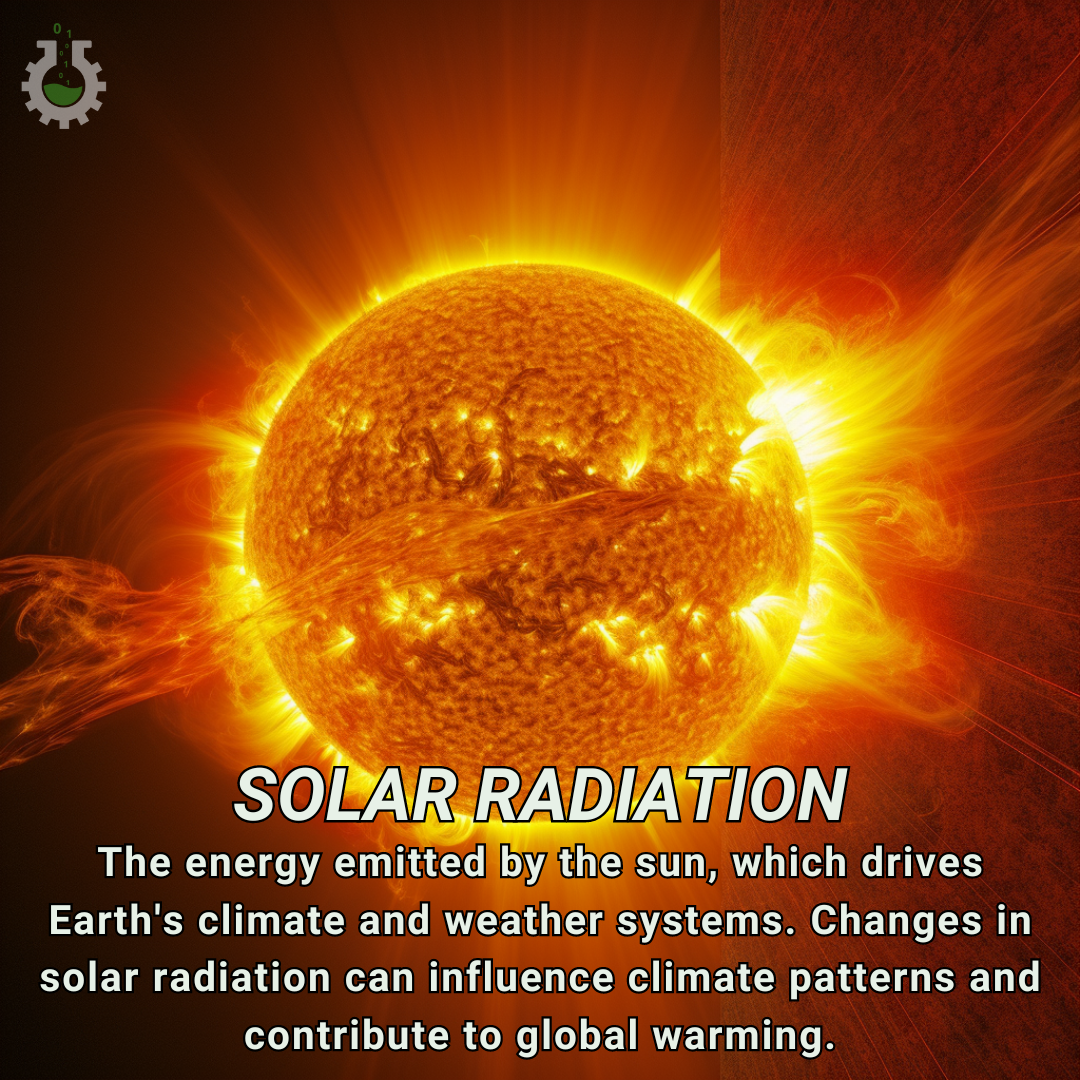May 16, 2024
Climate Change Poster Collection of the Day – Solar Radiation
Book a Demo
Today’s Climate Change Poster Collection highlights Solar radiation, the primary source of energy for Earth’s climate system, plays a crucial role in driving the planet’s weather patterns and climate. When solar radiation reaches the Earth, it interacts with the atmosphere, oceans, and land surfaces in a complex dance of absorption, reflection, and re-emission. This delicate balance of energy is fundamental to maintaining the Earth’s temperature and supporting life. However, human activities, particularly the burning of fossil fuels such as coal, oil, and natural gas, along with deforestation and other land-use changes, have significantly disrupted this balance. The combustion of fossil fuels releases vast amounts of greenhouse gases, including carbon dioxide (CO2), methane (CH4), and nitrous oxide (N2O), into the atmosphere. These gases possess the unique ability to trap heat, acting much like the glass of a greenhouse, hence the term “greenhouse effect.”
As the concentration of these greenhouse gases increases, more of the Sun’s energy becomes trapped in the Earth’s atmosphere, leading to an enhanced greenhouse effect. This results in a gradual increase in global temperatures, a phenomenon known as global warming. The implications of this enhanced greenhouse effect are far-reaching and multifaceted. One of the most immediate and visible impacts is the alteration of weather patterns, leading to more frequent and severe weather events such as hurricanes, heatwaves, droughts, and heavy rainfall. These extreme weather events can have devastating consequences for communities, economies, and ecosystems.
Furthermore, the rising global temperatures contribute to the melting of polar ice caps and glaciers, leading to rising sea levels. This not only threatens coastal communities with increased flooding and erosion but also disrupts marine ecosystems and the species that depend on them. The warming of the oceans also contributes to the bleaching of coral reefs, which are vital to marine biodiversity. In addition to these physical changes, climate change driven by increased solar radiation trapping has profound effects on ecosystems and biodiversity. Many species are forced to migrate to new habitats, while others face the threat of extinction due to the rapid changes in their environments. This loss of biodiversity can disrupt ecological balance and reduce the resilience of ecosystems to adapt to changing conditions.
Human systems are equally vulnerable to the impacts of climate change. Water scarcity becomes more pronounced as precipitation patterns shift and glaciers, which serve as critical freshwater sources, continue to melt. Agriculture and food security are threatened by changing growing seasons, increased incidence of pests and diseases, and extreme weather events that can destroy crops. Human health is also at risk, with increased heat-related illnesses, the spread of vector-borne diseases, and the exacerbation of respiratory conditions due to poor air quality.
Understanding the intricate relationship between solar radiation and climate change is essential for developing strategies to mitigate and adapt to its impacts. Mitigation efforts focus on reducing greenhouse gas emissions through measures such as transitioning to renewable energy sources like solar, wind, and hydroelectric power, improving energy efficiency, and promoting sustainable land-use practices. Enhancing carbon sinks, such as reforestation and soil carbon sequestration, also plays a crucial role in capturing and storing CO2 from the atmosphere. Adaptation strategies are equally important and involve making adjustments to social, economic, and environmental practices to minimize the adverse effects of climate change. This includes building resilient infrastructure, implementing water management strategies, and developing early warning systems for extreme weather events.
By acknowledging the pivotal role of solar radiation in climate dynamics, we can better appreciate the urgency of concerted global efforts to combat climate change. International cooperation and policy frameworks, such as the Paris Agreement, are vital in coordinating efforts to limit global temperature rise and protect our planet for future generations. Public awareness and education are also crucial in driving individual and collective actions toward a sustainable future. Ultimately, addressing the challenges posed by climate change requires a holistic approach that integrates scientific understanding, technological innovation, policy measures, and community engagement. Through these concerted efforts, we can work towards a more resilient and sustainable world, ensuring the well-being of both current and future generations.
Discover an inspiring collection of climate change poster.



